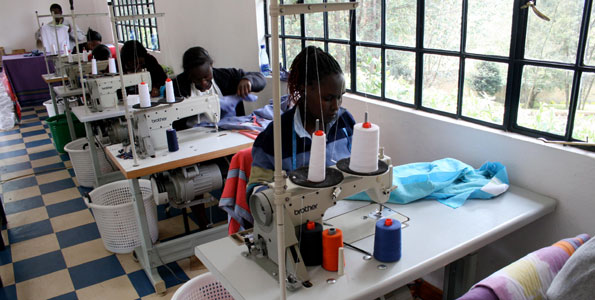The number of small businesses keeps growing in the formal and informal sectors of the Nigerian economy, due to the role of small businesses as the live-wire of any economy and the backbone of major developed economies the world over. Though Nigeria rely majorly on oil and revenues derived from it, from context observation the economy is largely supported by small businesses covering almost all spheres of activities including skilled and unskilled within the country, ranging from Nano, kiosk, and Micro businesses most importantly. A visible reference usually includes the vulcanisers, corner shop owners, single retail marketers, repairers, painters, business center operators, restaurants, market women, and men in the various open markets, among others. and the formal operations such as the law firms, accounting firms, consulting, fintech, and real estate companies, and so on in the country.
The small business economic activities in Nigeria play an unrecognised but important role all across the country and can equally contribute largely to the growth of the non-oil sector, employment generation, and in the creation of more sustainable entrepreneurship if well harnessed. For instance, the popular computer village in Ikeja, Aba Ariaria market in Abia State, Kano Kurmi Market in Kano State, and Onitsha market in Anambra State all consist of clusters of mostly nano, micro, and small businesses with huge economic engagements, however without much involvement by the government.
Arguably small business represents a large chunk of private businesses in the country and contributes to more than 50 per cent of employment in Nigeria. Small businesses in Nigeria account for 48 per cent of the national GDP in the last five years. They account for about 50 per cent of industrial jobs,96 per cent of businesses and 84 per cent of employment in the country, and nearly 90 per cent of the manufacturing sector, in terms of the number of enterprises according to the Nigeria Bureau of Statistics (NBS).
As it stands and relying on the Nigeria Bureau of Statistics (NBC) report shows that the total number of enterprises in Nigeria was estimated at 41.5 million, spread out across the 36 states in the country. The breakdown further shows that microenterprises constitute a high 99.8 per cent (41.4 million) of total SMEs. The country enjoys a high presence of small businesses and this form of business predominates any other form of businesses in the country. Why is that? The simple reason that comes to mind is largely due to the many advantages small businesses present. From a survey conducted amongst small business owners, independence is the key driver and this gives the advantage for entrepreneurs to be their own bosses and be self-reliant. This singular attribute makes the total financial gain (100%) be that of the entrepreneur or the business owner. Small business gives the operator the total business control without any form of dilution from external investors, which is a form of prestige for the operators according to the views gathered from the survey conducted.
Without doubts, this form of business is easy to set up and enjoys low or no serious regulatory requirements, unlike large enterprises. In fact, it is usually made up of 1-3 people, with even less than N100,000 initial capital outlay to operate. This form of business structure in most cases provides direct services, what do I mean? Hairdressers, fashion designers, dry-cleaners, artisans, kiosk point of sales (PoS)operators, and event planners to mention a few, provide services directly to customers, and with that, they enjoy quick patronage and easy payments. The administration of small business services is not cumbersome the problem of coordination and communication which is a major setback to the operations of large firms is therefore easily solved in small businesses. They conveniently give keen interest and personal attention to the particular requirements of their customers who in some cases willing to pay something extra for the special and urgent services rendered. Some customers are tied to these small businesses because of the exiting long relationship and personal attention they enjoy in the business. Further to this is the decision-making and taking process, because most owners of the small businesses are the operators or managers, there is hardly any problem in the decision process. Unlike the large enterprise approval processes, decision processes and dealing with customers can take a lot of time but with small businesses, the structure is simple with less bureaucracy.
The vivid truth is those small businesses enjoy agility and flexibility because of the ease with which the businesses can transmute and transfer capital to other sectors or industries, just in case the business operators need to react quickly to opportunities. In short small businesses can dramatically change their business model to align with new opportunities, which is the prime driver of innovation and creativity. The survey also led to the conviction that focus is another important advantage of running a small business, the focus of the operators is relatively narrow, and this appears to be a good trait. While large enterprises have to search far and wide for opportunities, small businesses tend to know exactly where they have the most competitive advantage.Therefore, with all these attributes a well-functioning small business sector would add more value to the economic fortunes of the country, sustain livelihoods, reduce poverty by creating more job opportunities in the economy than any other sector. Furthermore, these attributes can also give small businesses a competitive edge over large corporate entities and can help shape their success.
In conclusion, the government should get more involved in the growth, development, and sustainability of small businesses within the country. The Nigerian government needs to realise and recognise that small businesses are crucial to job creation, economic diversification, innovation, poverty reduction, wealth creation, and income redistribution in their policy-making activities. If this sector is well harnessed in Nigeria it can be a huge catalyst in transforming the country economically. On a final note, governments and financial institutions can support small businesses through funding, training programmes, and business-friendly policies, including access to tax incentives, and reduced regulatory barriers because small businesses can be a great tool to reduce the increasing unemployment rate in the country. Investing in small business growth is a strategic approach that President Tinubu led government can use to achieve sustainable employment levels. Good Luck!
How may you obtain advice or further information on the article?
Dr. Timi Olubiyi, an Entrepreneurship & Business Management expert with a Ph.D. in Business Administration from Babcock University, Nigeria. A prolific investment coach, adviser, author, columnist, seasoned scholar, Member of the Institute of Directors, Chartered Member of the Chartered Institute for Securities & Investment (CISI), and Securities & Exchange Commission (SEC) registered capital market operator. He can be reached on the Twitter handle @drtimiolubiyi and via email: drtimiolubiyi@gmail.com, for any questions, reactions, and comments. The opinions expressed in this article are those of the author- Dr Timi Olubiyi and do not necessarily reflect the opinions of others.





